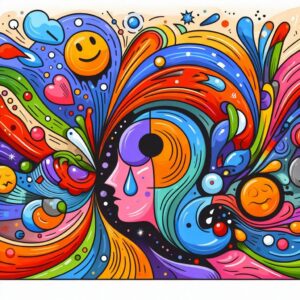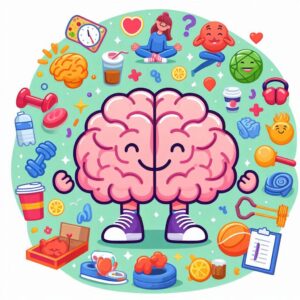Embracing the Roller Coaster: Understanding Bipolar Disorder
Bipolar disorder is a mental health condition that causes shifts in mood, energy, and activity levels, sometimes feeling extreme. People may experience highs, called mania, or lows, called depression, which can impact daily life. It’s not anyone’s fault and is more common than many realize. Treatment and support can help manage symptoms. This blog covers the basics to help you or someone you care about understand it better.
What is Bipolar Disorder?

Bipolar disorder is a mental health condition that causes extreme changes in mood, energy, and behavior. These changes are not just regular ups and downs—they can significantly affect a person’s daily life. People with bipolar disorder experience two main mood phases: the manic phase and the depressive phase. These phases can vary in intensity and how long they last, and some people may go through long periods of stability in between.
Manic Phase:
During the manic phase, a person might feel unusually energetic, excited, or confident. They may seem very happy or act impulsively, making decisions without thinking about the consequences. For example, they might spend large amounts of money, take risks they normally wouldn’t, or talk faster than usual. Some people may also feel irritable or easily annoyed. In more severe cases, they might have trouble understanding what’s real and what isn’t, which could lead to confusion or risky behavior.
Depressive Phase:
In the depressive phase, a person may feel extremely sad, hopeless, or tired. They might lose interest in activities they usually enjoy, have trouble concentrating, or feel like they don’t have enough energy to get through the day. It can also affect their appetite or sleep—some people may sleep too much, while others might have trouble sleeping at all. These feelings can make it hard to work, study, or maintain relationships.
Bipolar disorder is a serious condition, but it can be treated with the right support and care. If you or someone you know might have symptoms of bipolar disorder, it’s important to talk to a doctor or mental health professional. Treatment can help manage the mood changes and make life feel more stable.
Causes of Bipolar Disorder

The exact causes are not completely understood. It’s likely that a mix of genetic, biological, and environmental factors play a role in its development. Here are some possible factors that may contribute:
Genetics
Bipolar disorder often runs in families, which suggests that genetics are involved. People with a family history of the condition have a higher chance of developing it. However, not everyone with a family history will get bipolar disorder, which means other factors also play a part.
Chemical Imbalances in the Brain
Bipolar disorder has been linked to problems with certain brain chemicals, such as serotonin, dopamine, and norepinephrine. These chemicals help control mood, and, if their levels or activity are off, it can lead to symptoms of bipolar disorder.
Brain Structure and Activity
Research shows that people with bipolar disorder may have differences in how certain parts of their brain look and work. These areas, which are involved in managing emotions—like the prefrontal cortex, amygdala, and hippocampus—might function differently in people with the condition.
Hormone Issues
Problems with hormones, especially those related to the body’s stress response system (called the HPA axis), have been connected to bipolar disorder. When this system isn’t working properly, it may lead to the mood problems seen in the condition.
Environmental Factors
Certain life experiences can trigger or worsen bipolar disorder, especially in people who are already at risk. Stressful events, such as trauma, loss, or major life changes, can cause episodes of mania or depression. Substance use and poor sleep habits can also make symptoms worse.
It’s important to remember that these factors don’t guarantee someone will develop bipolar disorder. Many people with risk factors, like a family history or exposure to stress, never experience the condition. This shows how complicated the causes of bipolar disorder really are. More research is needed to fully understand how genetics, brain function, and life experiences work together to cause the disorder.
The Impact of Bipolar Disorder

Living with bipolar disorder can be tough for both the person affected and their loved ones. Some of the common challenges include:
Relationship problems
The extreme mood swings that come with bipolar disorder can make relationships with family, friends, and romantic partners difficult. People close to someone with the condition might have trouble understanding sudden changes in behavior, which can cause frustration, confusion, or a feeling of not knowing how to help.
Work and school challenges
Bipolar disorder can make it hard to stay consistent at work or in school. During manic episodes, someone might have lots of energy and get a lot done, but depressive episodes can make it hard to focus, stay motivated, or perform well overall.
Feeling alone
Mental health conditions often carry a stigma, which can lead to people feeling judged or misunderstood. This may cause them to avoid social situations and spend less time with others, leading to loneliness and possibly making depression worse.
Other health problems
People with bipolar disorder are more likely to also deal with conditions like anxiety, substance abuse, or physical health problems. These additional issues can make managing bipolar disorder harder and often require extra care and treatment.
Coping Strategies for Living with Bipolar Disorder

Managing bipolar disorder can be challenging, but with the right support and care, people can live meaningful and satisfying lives. Here are some simple strategies to help manage the condition:
Get professional help
It’s important to see mental health professionals for a proper diagnosis and ongoing care. Medication, therapy (like cognitive-behavioral therapy and psychoeducation), and personal strategies can help you better understand your condition, handle symptoms, and reduce the chances of future episodes.
Create routines
Sticking to a regular daily schedule, including consistent sleep times, exercise, and meals, can help balance your mood and keep symptoms under control. Having structure in your day can bring stability and make it easier to manage mood changes.
Build a support system
Having caring people in your life is key. Family, friends, support groups, and online communities can give you understanding, encouragement, and practical help when things feel tough.
Take care of yourself and manage stress
Focus on self-care activities like practicing mindfulness, enjoying hobbies, and finding healthy ways to handle stress. Learning what triggers your symptoms and having strategies in place to deal with them can improve your mental health and help you feel more in control.
By using these strategies, people with bipolar disorder can work toward a healthier, more balanced life.
Conclusion:
Living with bipolar disorder can be challenging, but with the right support, understanding, and treatment, people can manage their emotions and live meaningful lives. By showing kindness, spreading awareness, and creating a helpful environment, we can reduce the stigma surrounding bipolar disorder and encourage a society that values mental health. Remember, asking for help shows strength, and no one should have to face bipolar disorder alone.










